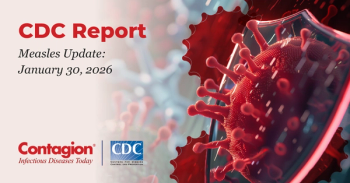
Not Too Late: Vaccination after COVID-19 Heightens Protection
Infection-acquired immunity to SARS-CoV-2 remains higher for longer when followed by vaccination.
Vaccination of persons previously infected with SARS-CoV-2 resulted in greater and longer protection than either the infection-acquired immunity or the vaccination alone, in the large SIREN
The study also found, as have others, that the Pfizer-BioNTech mRNA vaccine provided greater protection than the AstraZeneca viral vector vaccine.The level of effectiveness of each appeared consistent whether the primary doses were separated by long (≥6 weeks) or short (≤6 weeks) intervals.
"Improved understanding and characterization of vaccine effectiveness at longer dose intervals and potential variation in effectiveness according to demographic factors, vaccination schedules, and history of SARS-CoV-2 infection are urgently needed to inform vaccination strategies," explained Susan Hopkins, FRCP, UK Health Security Agency and the Health Protection Research NIHR Unit in Healthcare Associated Infections and Antimicrobial Resistance, University of Oxford, UK, and colleagues of the SIREN Study Group.
The investigators identified a prospective cohort of 35,768 asymptomatic healthcare workers who underwent routine PCR testing and had high vaccine utilization (97% received 2 doses of either the Pfizer or the AstraZeneca vaccine). Of these, 27% (9,488) had a previous SARS-CoV-2 infection.
Vaccine effectiveness was determined by absence of a PCR-confirmed SARS-CoV-2 infection≤10 months after the first dose, although the length of follow-up varied between participants. Breakthrough first-time infections after vaccination were observed in 2,747 and 210 experienced re-infection.
Hopkins and colleagues reported that among previously uninfected participants, the effectiveness of the Pfizer-BioNTech vaccine was 85% (95% CI, 22-69) 14 to 73 days after the 2nd dose, waning to 51% (22-69) at a median of 201 days after the second dose.The AstraZeneca vaccine was significantly less effective, at 58% (23-77)14 to 73 days after the second dose
The investigators considered the emergence of the Delta variant during this period of the study as a likely factor in the pronounced waning of protection. They noted that it became the dominant strain during the follow-up period, and that other studies had shown it more transmissible despite vaccination.
In those who had been infected before the study and remained unvaccinated, the risk of reinfection during follow-up was 86% (81-89) lower than those unvaccinated without previous infection.There was evidence that this protection also waned, with reduction to 69% (38-84) lower than those without prior infection during the first year after infection and 54% (3-78) lower after more than 1 year.
When vaccination was provided to those previously infected, however, protection remained consistently higher than 90% for up to the 1 year follow-up period, even in persons whose primary infection had occurred more than 18 months prior to vaccination.
"Vaccination after previous infection appeared to boost and extend immunity, and we found no indication of waning of this immunity even more than 1 year after primary infection," Hopkins and colleagues reported. "Protection against symptomatic infection in the cohort of participants who were vaccinated after previous infection was similar to that reported after a 3-course vaccination—2 doses and a booster dose."
The investigators acknowledge the possibility that the sustained infection-acquired protection in this cohort of healthcare workers was affected by repeated low-dose occupational exposure to COVID-19, and therefore might not be fully generalized to populations with lower exposure.
Newsletter
Stay ahead of emerging infectious disease threats with expert insights and breaking research. Subscribe now to get updates delivered straight to your inbox.



































































































































